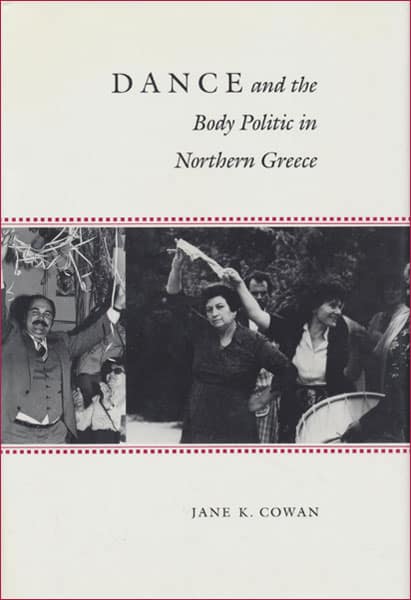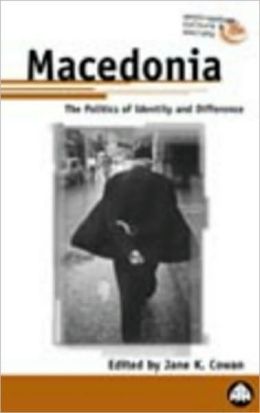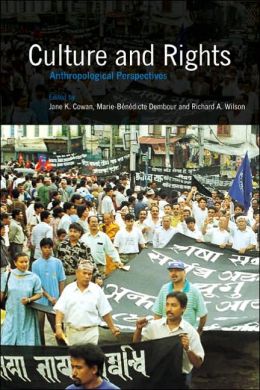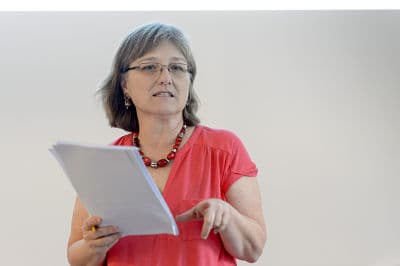Today Allegra pays tribute to an extraordinary scholar and person – Jane Cowan!
Jane Cowan is Professor of Social Anthropology at the Department of Anthropology of the University of Sussex, and on the grand occasion of her 60th birthday we want to honour her tremendous contributions to the discipline via highlighting her most important scholarly work, as well as via statements of appreciation and affection forwarded by her long term colleagues, friends, supervisors and supervisees including, among others, Michael Herzfeld, Yael Navaro-Yashin and Marie-Bénédicte Dembour.

Her first book, Dance and the Body Politic in Northern Greece (Princeton, 1990) studies ‘dance events’ as a site where gender identities as well as other social hierarchies are both reproduced and challenged. Using the prism of embodiement and performance, Jane demonstrates how social meanings are incorporated in the body and expressed by it not only through discipline, but also through everyday pleasurable forms of sociability.
Her second book was an edited volume entitled Macedonia: The Politics of Identity and Difference (Pluto Press, 2000). The book argues that Macedonia as place and as concept is forged within a transnational network of diasporas, local communities, states and 

She is also the author of the ground-breaking essay ‘Culture and Rights after Culture and Rights‘ published in American Anthropologist in 2006, in which she argues that philosophical debates on ‘multiculturalism’ rely on outdated notions of ‘culture’, the ‘individual’ and ‘society’. She insists on the importance of empirical studies to better understand the specific contexts in which rights talks emerge and to avoid the liberal pitfalls that inform most debates on cultural diversity.
She is currently working on a manuscript on the UN Human Rights Council, in particular its monitoring mechanism ‘Universal Periodic Review’ (UPR). She is also the author of numerous book chapters and articles including:
(2013) Before Audit Culture: Towards a Genealogy of International Oversight of Rights. In: The Gloss of Harmony: The Politics of Policy Making in Multilateral Organisations. Brigitte Müller (Eds). London, Pluto Press, 103-133.
(2010) Justice and the League of Nations Minority Regime. In: Mirrors of justice: law and power in the post-Cold War era. Cambridge, Cambridge University Press, 270-290.
(2009) Anthropology and Human Rights: Do Anthropologists have an Ethical Obligation to Promote Human Rights. With Turner, T., Graham, L. R., Fluehr-Lobban, C. In: Human Rights: An Anthropological Reader. Oxford, Wiley-Blackwell, 198-206.
(2008) An Obligation to “Support Human Rights” Unconditionally Is Misguided Moralism. Anthropology News. Volume 47, Issue 7, page 7.
(2008) Fixing national subjects in the 1920s southern Balkans: Also an international practice. American Ethnologist. Volume 35, Issue 2, pages 338–356.
(2007) The Supervised State. Identities: Global Studies in Culture and Power. Volume 14, Issue 5, pages 545-578.
(2007) The success of failure? Minority supervision at the League of Nations. In: Paths to International Justice: Social and Legal Perspectives. Marie-Bénédicte Dembour and Tobias Kelly (Eds). Cambridge, Cambridge University Press, 29-56.
(2005) Peer Assessment or Peer Engagement? Students as Readers of Their Own Work. LATISS: Learning and Teaching in the Social Sciences, Volume 2, Issue 2, pages 99-119.
(2003) Who’s Afraid of Violent Language? Honour, Sovereignty and Claims-Making in the League of Nations. Anthropological Theory. Volume 3, Issue 3, pages 271-291.
(2003) Minority Rights Politics in Southeast Europe. In: Human Rights in Global Perspective: Anthropological Studies of Rights, Claims and Entitlements. Richard Wildon and Jon Mitchell (Eds). London & New York, Routledge.
(1996) Being a Feminist in Contemporary Greece: Similarity and difference reconsidered. In: Practising feminism: identity, difference, power. Nickie Charles, Felicia Hughes-Freeland (Eds). London & New York, Routledge, 61-85.
(1991) Going out for coffee? Contesting the grounds of gendered pleasures in everyday sociability. In: Contested identities: Gender and kinship in modern Greece. Princeton, Princeton University Press,180-202.
(1988) Folk Truth: When the Scholar Comes to Carnival in a “Traditional” Community. Journal of Modern Greek Studies. Volume 6, Number 2, pages 245-260.
Honouring Jane Cowan:
“Jane Cowan was my first Ph.D. student to work in Greece. From the start, I never really knew who was learning from whom — she brought a mature wisdom to our conversations, whether they were about the ethnography of the Greek world or how to deal with the peculiarities of American and British culture in contact! I often thought that her initials (“JKC”) were indicative of some spiritual relation with my own supervisor, the late J.K. Campbell (and we should not forget that naming is often in alternating generations in Greece!). What she particularly brought to the study of Greek society and culture, aside from the original approach to gender issues that distinguished her thesis and then the book that grew out of it, was the move to a suburban, bourgeois culture that she showed to be just as interesting as the rural and exotic places we had studied. In her later work, on minority politics and their international management, she has also developed an original and critical perspective, one that contests facile judgmentalism. Her remarkable combination of intellectual toughness, personal gentleness and compassion, an impish sense of humor, and a strong streak of pedagogical concern (for her elders as much as her juniors!) informs everything she does — her daily interactions as much as her lasting contributions to scholarship. Happy birthday, Jane, and thank you for making me so proud of you!”
Michael Herzfeld, Ernest E. Monrad Professor of the Social Sciences in the Department of Anthropology, Harvard University.
“Jane Cowan’s earlier work was a study of gender and the body in Greece through anthropological work on dance. Her contribution in this area has been marked in both the regional anthropological domain as well as, more theoretically and broadly, in the anthropology of gender. Her more recent work has pushed the boundaries of state-centered political anthropology, incorporating the ‘international’ as an anthropological object for the study of politics and law. She has done this through ethnographic and historical work on minority quests and petitions to the League of Nations from Macedonia, illustrating the trans-local imagination as embedded in what previously used to be represented as regionally based ‘identities.’ Her anthropological work in Southeastern Europe has set a standard for the anthropology of the region, which we continue to try and emulate. It is with heartfelt warmth that I write this to Jane on her birthday, wishing her the liveliest and most joyful, soulful years to come. With love from Yael”
Yael Navaro-Yashin, Reader in Anthropology, Cambridge University.
“What is Jane Cowan for you? A dear friend, an amazing colleague, a profound scholar. We met on our induction day at the University of Sussex over twenty years ago. We clicked immediately. I have been extremely lucky to have her so close to me throughout my career.
What do you appreciate in her? Her instantaneous grasp and in-depth comprehension of the complexity of social life and social actors, her insightfulness, the clarity and precision of her arguments, her political engagement, passion, confidence, fearlessness, integrity, relevance, readiness to say what others silently think … The list could go on.
What’s your favoured piece by her? It is difficult to say. Last week I happened to go back and quote in my own work a short, two-page, piece where she warns against supporting human rights unconditionally as not being good enough in order to face adequately the big current problems in the world. It was published in 2006 but is as apposite today as it was then. Her publications are all so rich that they do not lose their freshness, elegance, and relevance. One goes back to them with a renewed sense of gratitude for the fact they have been written.
What can we expect from her next? The same vigour, the same clarity, the same determination and tenacity. Jane has accumulated a wealth of data, insights and ideas which she has not yet had the opportunity to put in writing. Much is in store which is awaiting to come out. She has not said her last word. Watch her space!”
Marie-Bénédicte Dembour, Professor of Law and Anthropology, University of Brighton.
“Jane Cowan has honored me with her friendship and collegiality for many years, since the mid 1980s. As a friend, her open mindedness and warmness has helped me share my personal or family ‘secrets’ with her and feel relieved, whereas her collegial spirit has encouraged me many times to do things I dared not do. Because she loves me, sometimes she even lies to me: either she pretends she did not notice an improper behavior to her from my part, or she insists that I speak and write in English “perfectly”! Jane is not only an excellent anthropologist but also an excellent anthropos! The only problem I have with Jane is that she looks (constantly) much younger than me! I hope that now that she enters the 60s she will make the friendly effort to look a little bit older – than me. Happy birthday, Jenaki mou, I love you and your young soul very much!!!”
Eleni Papagaroufali, Associate Professor of Anthropology, Panteion University.
“My first ‘meeting’ with Jane Cowan was through her book “Dance and the Body Politic in Northern Greece”. After finishing the reading of the book in 1993, I decided to approach her and ask her to be the supervisor of my PhD thesis on music and memory among a group of Asia Minor refugees. I met Jane for the first time during the summer of 1993 at Sussex University. I felt lucky when she accepted me as her first PhD student. During our meetings, Jane was always interested in learning about Greece, music, politics, and newly published books. As my supervisor, I remember her being enthusiastic with small things: an idea, an argument or with my rather surrealist writing, partly due to my poor knowledge of English! In spite of her work and her family duties, Jane dedicated a lot of time restructuring my text, correcting my English and suggesting relevant readings. As a teacher, Jane was always friendly, patient, critical, inspiring, encouraging and supportive. Her pedagogic skills have deeply influenced my own way of teaching today. As many others among Jane’s students and friends I am deeply touched by Jane’s humanity, generosity and kindness. Jane is a beloved friend, an esteemed teacher and I still feel as her student despite the fact that we are almost the same age. Jane, please accept my warmest wishes and love on your birthday: I wish your life to be as generous with you as you have been with us!”
Giorgos Tsimouris, Associate Professor, Department of Social Anthropology, Panteion University.
“One way to describe Jane’s contribution to our lives and many others’ around the world is to picture her as a mother, our intellectual and spiritual mother. In a way, she has nurtured our lives. She helped us understand Anthropology not only as a discipline but as a way of self-knowledge and a view on the world. She has been always there to listen and talk. She has understood our frustrations, anxieties and worries and generously offered comfort, motivation and inspirational guidance. She has been true and caring. That is her legacy to her current and former students and the people who have known her.”
Ioannis Mannos, University of Macedonia.
“Jane is the person who introduced me to anthropology as I moved from France to the UK to study a Master Degree. The course she gave on ‘Gender and identity in Europe’ made me realise that there was an alternative way to produce knowledge and write academic texts, aside from the disciplines of literature and politics where I was initially trained. The texts she gave us to read during that semester combined all the ingredients I had always looked for: beautifully written stories grounded in real life experiences and theoretical sophistication. Suddenly, the world was no more ‘black and white’. It had the texture of life itself. At the end of my MA, I started to work for an international NGO, which sent me to various countries: Cambodia, Afghanistan, Thailand and Myanmar. After three years of wandering around the world, I wrote to Jane and asked her whether she would agree to supervise my PhD. Her enthusiasm and trust at a moment when I was full of doubts are the most precious gifts I ever received. Jane supervises PhDs in the same way as she conducts fieldwork. She knows how to create an environment that allows relationships to grow. It is this freedom (that some of her PhD students sometimes find overwhelming) that gave me the confidence to follow my intuitions and make the best out of my material. I am very honoured to have been able to assist her in her more recent research venture at the UN. Her gaze makes her able to see the unexpected in the most tedious circumstances. It is through our conversations, made richer by her historical knowledge of the ‘international’, that I was able to find ‘meaning’ in what initially appeared to me as mere bureaucratic platitudes. I am and will remain eternally grateful for our friendship and for teaching me how to look at the world in such a way that it remains a constant source of intellectual puzzlement.”
Julie Billaud, Researcher, Max Planck Institute for Social Anthropology, Halle/Saale
It was my first year of graduate school when I read Jane’s book on the body and dance in northern greece, and her work played a huge role in my deciding to do research in Greece. But her continued innovations in the realms of law, bureaucracy, and international politics have been at least as significant. Later I was lucky to benefit from her support and mentorship during a wonderful few months at Sussex. Jane exemplifies what so many of us would love to emulate : outstanding scholarship coupled with a wonderful sense of humor and a commitment not to take things too too seriously. Her youth, energy, adventurous spirit, and ongoing work are inspiring. All the very best to an extraordinary person and scholar! Φιλιά πολλά.
Heath Cabot, College of the Atlantic
I first met Jane at a conference in 2007 as I seized an opportunity to tell her how much I enjoy her writings. She thanked me most courteously but seemed slightly tentative – as someone who has certainly experienced the same many times before, but who still finds such moments of ‘gushing’ slightly awkward. Why did I feel the need to approach her? I have since learned that my enthusiasm was based on but a fraction of her scholarly endeavors, namely her few writings (at the time) on human rights. This work had inspired – and still does – the kind of sensations that few other scholars have awakened, making me repeatedly feel that where there previously was ‘blur’ caused by much scholarship on human rights and ‘multiculturalism’, there now is ‘sense’ and theoretical horizons. Since our first brief encounter I have enjoyed the extraordinary fortune of collaborating with Jane both in regards to our shared interest in the early phases of the contemporary human rights phenomenon as well as contemporary UN human rights monitoring. On both accounts I consider myself as tracing under lucky starts, for so profound has been the impact of her personal guidance and writings on my scholarly work. The only way to describe this is that our recurring discussions and her texts arrived at a moment of intense desires of scholarly re-invention, and made my brain go ‘click’ as it shifted to a gear that I did not know even existed. Jane exemplifies all the characteristics of why one would want to be an academic. She shows that you can have and do ‘it all’, yet makes no pretences that it is always easy. Why does she do it all? Because of her devotion to the importance of scholarly work in the world. Or as she herself says of being an anthropologist: It’s simply the greatest profession to have. My warmest thanks for everything & my most heartfelt congratulations on this special date – and looking forward to much more in the future!
Miia Halme-Tuomisaari, Max Planck Institute for Social Anthropology, Halle/Saale
Photo credit: Maurice Weiss @ Rechtskulturen, Berlin.






